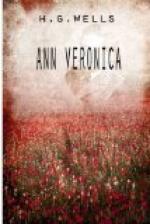As Ann Veronica went back along the Avenue to her aunt she became aware of a light-footed pursuer running. Teddy overtook her, a little out of breath, his innocent face flushed, his straw-colored hair disordered. He was out of breath, and spoke in broken sentences.
“I say, Vee. Half a minute, Vee. It’s like this: You want freedom. Look here. You know—if you want freedom. Just an idea of mine. You know how those Russian students do? In Russia. Just a formal marriage. Mere formality. Liberates the girl from parental control. See? You marry me. Simply. No further responsibility whatever. Without hindrance—present occupation. Why not? Quite willing. Get a license—just an idea of mine. Doesn’t matter a bit to me. Do anything to please you, Vee. Anything. Not fit to be dust on your boots. Still—there you are!”
He paused.
Ann Veronica’s desire to laugh unrestrainedly was checked by the tremendous earnestness of his expression. “Awfully good of you, Teddy.” she said.
He nodded silently, too full for words.
“But I don’t see,” said Ann Veronica, “just how it fits the present situation.”
“No! Well, I just suggested it. Threw it out. Of course, if at any time—see reason—alter your opinion. Always at your service. No offence, I hope. All right! I’m off. Due to play hockey. Jackson’s. Horrid snorters! So long, Vee! Just suggested it. See? Nothing really. Passing thought.”
“Teddy,” said Ann Veronica, “you’re a dear!”
“Oh, quite!” said Teddy, convulsively, and lifted an imaginary hat and left her.
Part 3
The call Ann Veronica paid with her aunt that afternoon had at first much the same relation to the Widgett conversation that a plaster statue of Mr. Gladstone would have to a carelessly displayed interior on a dissecting-room table. The Widgetts talked with a remarkable absence of external coverings; the Palsworthys found all the meanings of life on its surfaces. They seemed the most wrapped things in all Ann Veronica’s wrappered world. The Widgett mental furniture was perhaps worn and shabby, but there it was before you, undisguised, fading visibly in an almost pitiless sunlight. Lady Palsworthy was the widow of a knight who had won his spurs in the wholesale coal trade, she was of good seventeenth-century attorney blood, a county family, and distantly related to Aunt Mollie’s deceased curate. She was the social leader of Morningside Park, and in her superficial and euphuistic way an extremely kind and pleasant woman. With her lived a Mrs. Pramlay, a sister of the Morningside Park doctor, and a very active and useful member of the Committee of the Impoverished Gentlewomen’s Aid Society. Both ladies were on easy and friendly terms with all that was best in Morningside Park society; they had an afternoon once a month that was quite well attended, they sometimes gave musical evenings, they dined out and gave a finish to people’s dinners, they had a full-sized croquet lawn and tennis beyond, and understood the art of bringing people together. And they never talked of anything at all, never discussed, never even encouraged gossip. They were just nice.




